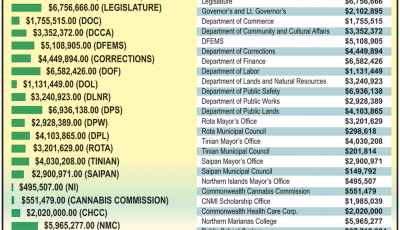Retrial of Grandpa Ping begins
The retrial of Jose Ilo Santos, a 63-year-old man accused of sexually abusing a then 7-year-old girl, began yesterday in Superior Court.
Associate Judge Joseph N. Camacho is presiding over the trial. When Saipan Tribune left the courtroom yesterday afternoon, Camacho was still giving instructions to the seven jurors.
Assistant attorney general Shannon Foley is prosecuting the case. Assistant attorney general Emily Cohen is assisting Foley in the trial.
Assistant public defender Michael Sato is counsel for Santos. Chief Public Defender Douglas Hartig is assisting Sato for the defense.
The retrial came about after the CNMI Supreme Court reversed Santos’ convictions last Dec. 2 and ordered a new jury trial.
The high court ruled that the trial court abused its discretion by permitting the victim advocate to accompany the alleged victim at the witness stand.
The CNMI government is unable to meet its burden of proving beyond a reasonable doubt that the error was harmless, according to the high court’s opinion penned by Associate Justice John A. Manglona and concurred by Chief Justice Alexandro C. Castro and Justice Pro Tem Herbert D. Soll.
The Office of the Attorney General charged Santos, also known as Grandpa Ping, with two counts of sexual abuse of a minor in the first degree for molesting the girl on April 23, 2011, and May 7, 2011, at his house in Tanapag.
In October 2012, the jury found Santos guilty of all charges.
In March 2013, Camacho sentenced Santos to the maximum of 60 years in prison, to be served without the possibility of parole.
Camacho noted that the violence done to the girl was so severe that nine days after the incident, doctors at the Commonwealth Health Center could still see the damage.
Santos appealed his conviction to the Supreme Court.
Before the first trial, Camacho held a hearing on the government’s motion to allow a victim advocate to accompany the girl near the witness stand.
During the hearing, Santos’ counsel contended that a victim advocate was improper without a showing of need.
In response, the government asserted that the victim advocate was appropriate under NMI Rules of Evidence 611 because the girl was young, and testifying about sexual abuse can be embarrassing.
After considering the parties’ arguments, Camacho granted the government’s request for a victim advocate to accompany the girl.
In reversing the convictions and remanding the case for a new trial, the justices ruled that a victim advocate can accompany a witness to the stand only after the court has made a finding of need for the accommodation.
The justices said because the trial court did not hear or consider evidence on the girl’s particular needs, there was no adequate basis to justify a finding of need for her accommodation.

























